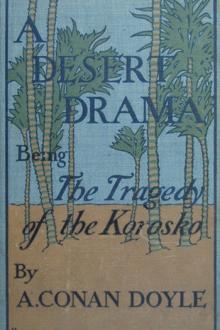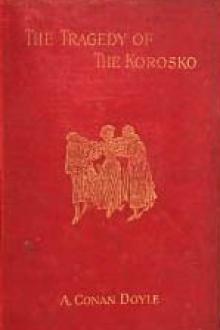A Desert Drama, Arthur Conan Doyle [best ebook reader for pc .txt] 📗

- Author: Arthur Conan Doyle
- Performer: -
Book online «A Desert Drama, Arthur Conan Doyle [best ebook reader for pc .txt] 📗». Author Arthur Conan Doyle
Slowly the sun sank towards the west, and their shadows began to trail along the path where their hearts would go. It was cooler, and a desert breeze had sprung up, whispering over the rolling, stone-strewed plain. The Emir at their head had called his lieutenant to his side, and the pair had peered about, their eyes shaded by their hands, looking for some landmark. Then, with a satisfied grunt, the chiefs camel had seemed to break short off at its knees, and then at its hocks, going down in three curious, broken-jointed jerks until its stomach was stretched upon the ground. As each succeeding camel reached the spot it lay down also, until they were all stretched in one long line. The riders sprang off, and laid out the chopped tibbin upon cloths in front of them, for no well-bred camel will eat from the ground. In their gentle eyes, their quiet, leisurely way of eating, and their condescending, mincing manner, there was something both feminine and genteel, as though a party of prim old maids had foregathered in the heart of the Libyan desert.
There was no interference with the prisoners, either male or female, for how could they escape in the centre of that huge plain? The Emir came towards them once, and stood combing out his blue-black beard with his fingers, and looking thoughtfully at them out of his dark, sinister eyes. Miss Adams saw with a shudder that it was always upon Sadie that his gaze was fixed. Then, seeing their distress, he gave an order, and a negro brought a water-skin, from which he gave each of them about half a tumblerful. It was hot and muddy and tasted of leather, but, oh, how delightful it was to their parched palates! The Emir said a few abrupt words to the dragoman and left.
“Ladies and gentlemen,” Mansoor began, with something of his old consequential manner; but a glare from the Colonel's eyes struck the words from his lips, and he broke away into a long, whimpering excuse for his conduct.
“How could I do anything otherwise,” he wailed, “with the very knife at my throat?”
“You will have the very rope round your throat if we all see Egypt again,” growled Cochrane, savagely. “In the meantime—”
“That's all right, Colonel,” said Belmont. “But for our own sakes we ought to know what the chief has said.”
“For my part I'll have nothing to do with the blackguard.”
“I think that that is going too far. We are bound to hear what he has to say.”
Cochrane shrugged his shoulders. Privations had made him irritable, and he had to bite his lip to keep down a bitter answer. He walked slowly away, with his straight-legged military stride.
“What did he say then?” asked Belmont, looking at the dragoman with an eye which was as stern as the Colonel's.
“He seems to be in a somewhat better manner than before. He said that if he had more water you should have it, but that he is himself short in supply. He said that tomorrow we shall come to the wells of Selimah, and everybody shall have plenty—and the camels too.”
“Did he say how long we stopped here?”
“Very little rest, he said, and then forwards! Oh, Mr. Belmont——”
“Hold your tongue!” snapped the Irishman, and began once more to count times and distances. If it all worked out as he expected, if his wife had insisted upon the indolent reis giving an instant alarm at Haifa, then the pursuers should be already upon their track. The Camel Corps or the Egyptian Horse would travel by moonlight better and faster than in the daytime. He knew that it was the custom at Haifa to keep at least a squadron of them all ready to start at any instant. He had dined at the mess, and the officers had told him how quickly they could take the field. They had shown him the water-tanks and the food beside each beast, and he had admired the completeness of the arrangements, with little thought as to what it might mean to him in the future. It would be at least an hour before they would all get started again from their present halting-place. That would be a clear hour gained. Perhaps by next morning——
And then, suddenly, his thoughts were terribly interrupted. The Colonel, raving like a madman, appeared upon the crest of the nearest slope, with an Arab hanging on to each of his wrists. His face was purple with rage and excitement, and he tugged and bent and writhed in his furious efforts to get free. “You cursed murderers!” he shrieked, and then, seeing the others in front of him, “Belmont,” he cried, “they've killed Cecil Brown.”
What had happened was this. In his conflict with his own ill-humour, Cochrane had strolled over this nearest crest, and had found a group of camels in the hollow beyond, with a little knot of angry, loud-voiced men beside them. Brown was the centre of the group, pale, heavy-eyed, with his upturned, spiky moustache and listless manner. They had searched his pockets before, but now they were determined to tear off all his clothes in the hope of finding something which he had secreted. A hideous negro, with silver bangles in his ears, grinned and jabbered in the young diplomatist's impassive face. There seemed to the Colonel to be something heroic and almost inhuman in that white calm, and those abstracted eyes. His coat was already open, and the negro's great black paw flew up to his neck and tore his shirt down to the waist. And at the sound of that r-r-rip, and at the abhorrent touch of those coarse fingers, this man about town, this finished product of the nineteenth century, dropped his life-traditions and became a savage facing a savage.
His face flushed, his lips curled back, he chattered, his teeth like an ape, and his eyes —those indolent eyes which had always twinkled so placidly—were gorged and frantic. He threw himself upon the negro, and struck him again and again, feebly but viciously, in his broad, black face. He hit like a girl, round arm, with an open palm. The man winced away for an instant, appalled by this sudden blaze of passion. Then with an impatient, snarling cry he slid a knife from his long loose sleeve and struck upwards under the whirling arm. Brown sat down at the blow and began to cough—to cough as a man coughs who has choked at dinner, furiously, ceaselessly, spasm after spasm. Then the angry red cheeks turned to a mottled pallor, there were liquid sounds in his throat, and, clapping his hand to his mouth, he rolled over on to his side.
The negro, with a brutal grunt of contempt, slid his knife up his sleeve once more, while the Colonel, frantic with impotent anger, was seized by the bystanders, and dragged, raving with fury, back to his forlorn party. His hands were lashed with a camel-halter, and he lay at last, in bitter silence, beside the delirious Nonconformist.
So Headingly was gone, and Cecil Brown was gone, and their haggard eyes were turned from one pale face to another, to know which they should lose next of that frieze of light-hearted riders who had stood out so clearly against the blue morning sky, when viewed from the deck-chairs of the Korosko. Two gone out of ten, and a third out of his mind. The pleasure trip was drawing to its climax.
Fardet, the Frenchman, was sitting alone with his chin resting upon his hands, and his elbows upon his knees, staring miserably out over the desert, when Belmont saw him start suddenly and prick up his head like a dog who hears a strange step. Then, with clenched fingers, he bent his face forward and stared fixedly towards the black eastern hills through which they had passed. Belmont followed his gaze, and, yes—yes—there was something moving there! He saw the twinkle of metal, and the sudden gleam and flutter of some white garment.
A Dervish vedette upon the flank turned his camel twice round as a danger signal, and discharged his rifle in the air. The echo of the crack had hardly died away before they were all in their saddles, Arabs and negroes. Another instant, and the camels were on their feet and moving slowly towards the point of alarm. Several armed men surrounded the prisoners, slipping cartridges into their Remingtons as a hint to them to remain still.
“By Heaven, they are men on camels!” cried Cochrane, his troubles all forgotten as he strained his eyes to catch sight of these new-comers. “I do believe that it is our own people.” In the confusion he had tugged his hands free from the halter which bound them.
“They've been smarter than I gave them credit for,” said Belmont, his eyes shining from under his thick brows. “They are here a long two hours before we could have reasonably expected them. Hurrah, Monsieur Fardet, ça va bien, n'est ce pas?”
“Hurrah, hurrah! merveilleusement bien! Vivent les Anglais! Vivent les Anglais!” yelled the excited Frenchman, as the head of a column of camelry began to wind out from among the rocks.
“See here, Belmont,” cried the Colonel. “These fellows will want to shoot us if they see it is all up. I know their ways, and we must be ready for it. Will you be ready to jump on the fellow with the blind eye, and I'll take the big nigger, if I can get my arms around him. Stephens, you must do what you can. You, Fardet, comprenez vous? Il est nécessaire to plug these Johnnies before they can hurt us. You, dragoman, tell those two Soudanese soldiers that they must be ready—but, but——” his words died into a murmur and he swallowed once or twice. “These are Arabs,” said he, and it sounded like another voice.
Of all the bitter day, it was the very bitterest moment. Happy Mr. Stuart lay upon the pebbles with his back against the ribs of his camel, and chuckled consumedly at some joke which those busy little cell-workers had come across in their repairs.
His fat face was wreathed and creased with merriment. But the others, how sick, how heart-sick, were they all! The women cried. The men turned away in that silence which is beyond tears. Monsieur Fardet fell upon his face, and shook with dry sobbings.
The Arabs were firing their rifles as a welcome to their friends, and the others as they trotted their camels across the open returned the salutes and waved their rifles and lances in the air. They were a smaller band than the first one,—not more than thirty,—but dressed in the same red head-gear and patched jibbehs. One of them carried a small white banner with a scarlet text scrawled across it. But there was something there which drew the eyes and the thoughts of the tourists away from everything else. The same fear gripped at each of their





Comments (0)